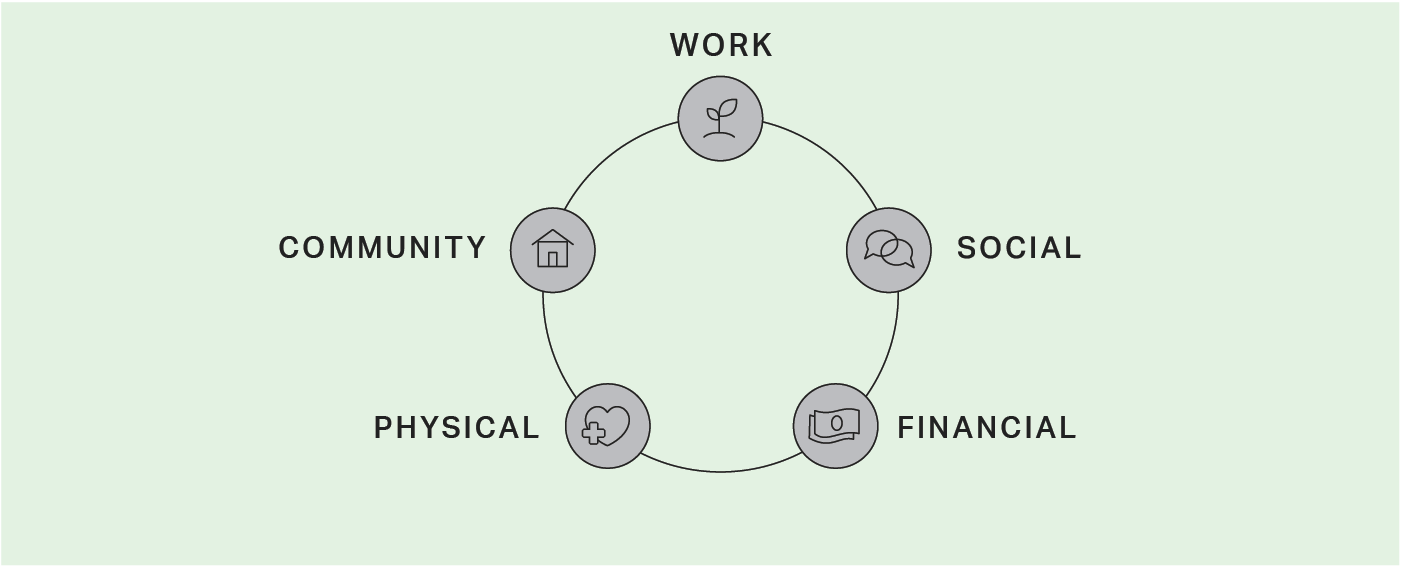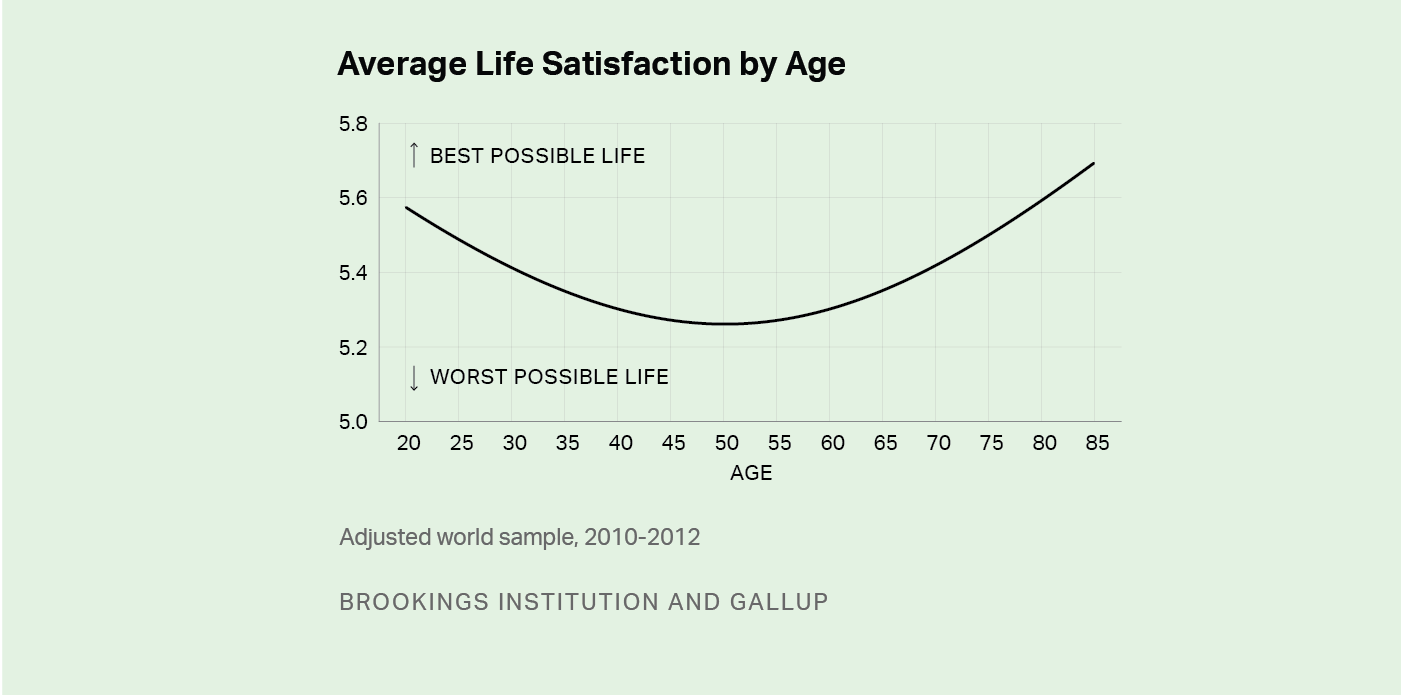The following is an excerpt from Blind Spot, Gallup's new book about the rising unhappiness leaders didn't see. For more insights like this, order your copy of Blind Spot today.
"If there are rules for living long -- and it seems that there are -- they would include these: Don't be fussy about your food, and never, never overeat. Don't worry. Work at a job you love, and if it gives you physical exercise, so much the better; if not, be sure to get your exercise -- and lots of it -- some other way." (George Gallup and Evan Hill, The Saturday Evening Post, 1959)
This was George Gallup's conclusion about the secrets to a long life. To uncover them, he and his colleagues studied more than 500 people who lived to be 95 and older. These nonagenarians and centenarians also described their life partners and children as their "comfort and pride." Most of them rarely worried about money, and perhaps surprisingly, half of them said that more income would not have made them any happier.
George Gallup discovered what leads to a long life, but his findings also point to what makes a great life.
While there are many different things that contribute to a great life, Gallup finds that there are five aspects all people have in common: their work, finances, physical health, communities, and relationships with family and friends. If you are excelling in each of these elements of wellbeing, it is highly unusual for you not to be thriving in life.

Custom graphic. Five symbols representing the five elements of wellbeing; work, financial, community, social and physical.
To discover these five elements, Gallup began by reviewing much of the vast literature on happiness and wellbeing. Search "wellbeing" on Google Scholar, and you will find over 1.9 million academic articles; "happiness" yields over 2.7 million articles. One person could not read every article in a lifetime, so we focused on meta-analyses -- which combine the results of multiple studies -- and the studies that had the greatest impact on the field of wellbeing research.
Then, we conducted surveys. Lots of them. To date, we have conducted about 5 million surveys in almost 170 countries -- roughly 2 million interviews in the U.S. and 3 million globally. We also conducted panel studies, which allow us to track the same people over time so we can better understand what causes changes in wellbeing, such as an economic collapse, a job loss, or the death of a spouse.
The global nature of this work is crucial. Research conducted only in the West comes under a great deal of scrutiny -- for good reason. These studies often include people who do not represent the entire world.
For example, the people who are recruited to participate in U.S. academic research are usually college students. This is problematic because U.S. college students are not representative of the world. In fact, they are not even representative of young people across the U.S.
This kind of research is called "WEIRD," which is an acronym for Western, Educated, Industrialized, Rich, and Democratic. Many U.S. academic studies rely solely on participants who fit these characteristics -- but often claim that the conclusions from the research apply to all people. The authors of this concept -- Joe Henrich, Steven Heine, and Ara Norenzayan -- caution, "We need to be less cavalier in addressing questions of human nature on the basis of data drawn from this particularly thin, and rather unusual, slice of humanity."
While there are many different things that contribute to a great life, Gallup finds that there are five aspects all people have in common: their work, finances, physical health, communities, and relationships with family and friends.
Gallup's wellbeing research is truly global, covering over 98% of the world's adult population. It includes almost every ethnic group, religion, and income level and virtually every kind of human experience worldwide.
In every survey, we ask people how they see and live their lives. Their answers become the outcomes of interest in our analysis -- meaning, we look at other variables to see what would help us explain how their lives are going. When someone says, "My life is a 10" or "I laughed and smiled a lot all day yesterday," what else do they tell us? Are they physically active? Do they love their job? Do they have a lot of friends? Or some combination of all three?
Gallup's research as well as research by the global community of wellbeing practitioners has produced hundreds, if not thousands, of discoveries.
One of the most famous discoveries is the U-curve of happiness, which shows how age is associated with wellbeing. Young people rate their lives high, and so do older people. But middle-aged people rate their lives the lowest. This trend holds every year in almost every country in the world. It is nicknamed the "U-curve" of happiness because when you look at the graph, it looks like a "U." Some jokingly say that the chart is smiling.

Line graph. U-shaped line showing wellbeing by age.
Some discoveries are astonishing; others feel like they reveal a "blandly sophomoric secret," as George Gallup referred to some of his longevity findings. For example, you could argue that the U-curve of happiness simply quantifies conventional wisdom -- that people have midlife crises.
Here are a few of the discoveries that are truly compelling:
- People who love their jobs do not hate Mondays.
- Education-related debt can cause an emotional scar that remains even after you pay off the debt.
- Volunteering is not just good for the people you are helping; it is also good for you.
- Exercising is better at eliminating fatigue than prescription drugs.
- Loneliness can double your risk of dying from heart disease.
We could list every insight ever produced from this research and encourage leaders to work on all of them. Instead, we took another approach. Using all these insights from across the industry combined with our surveys and analysis, we created the five elements of wellbeing. And our ongoing global research confirms that the five elements of wellbeing are significant drivers of a great life everywhere.
Wellbeing research by other organizations has produced similar results. A 2021 study by the Pew Research Center spanning 17 countries found that the top answers people gave when asked what makes life meaningful were: family and children, occupation and career, material wellbeing (wealth), friends and community, and physical and mental health.
But while Gallup's five elements of wellbeing explain a lot of what makes a great life, they do not explain all of what makes a great life. Pablo Diego-Rosell, my colleague in Spain, looked at how much the five elements of wellbeing predict a great life. He found that they predict at least 50% of a great life globally.
Genetics is another major factor. Research (including several studies of twins) finds that genetics plays a significant role in someone's wellbeing. Studies estimate that 30% to 50% of someone's emotional state was built in the day they were born.
This is often called the happiness set point: No matter what happens to you in your life, you revert to your genetically determined set point. For example, let's say you rate your life a 7 today; tomorrow, you move into a big new house. After the move, you rate your life a 10. The happiness set point theory suggests that the emotional bounce you got from moving into the new house will eventually wear off. In a year or two, your life rating will revert to a 7 (your set point) -- your rating before moving into the new house.
The same is true if something awful happens, such as getting into an accident. You were a 7 before the accident, but after the accident, you rate your life a 2. Despite the trauma, later in life you revert to a 7. However, more recent research finds that people often do not have a complete rebound from a traumatic experience -- if something awful happens, you may still improve, but not to where you were originally.
A theory similar to the happiness set point is the "hedonic treadmill," which says that by nature, people are always running toward a better life, but no matter what happens, their happiness always remains in the same place.
But if people are born with a predetermined level of happiness, why are happiness levels so different by country, and why are they changing globally?
How someone's life is going is undoubtedly influenced by their genetics, but external factors also play a large part. And we can examine those factors through the lens of the five elements of wellbeing.
The next five chapters will focus on the five elements of wellbeing and where the world is struggling in each of them. I chose to focus on where humanity is performing the worst because of the advice Gallup received from Daniel Kahneman when we were developing the Gallup World Poll.
Kahneman believes that the focus of leadership should not be on perfecting people's lives but on reducing global misery. Here is what he wrote in 2005 to the late Gale Muller, chief architect of the Gallup World Poll:
"I know this is not quite in the Gallup spirit, but I would strongly recommend that you look at the bottom end of your questions with special care. Most people in most places are fairly satisfied. The percentage of people who are very satisfied or very happy is not very relevant as a policy statistic. Much more relevant to policy is the percentage of people who are very unhappy, very worried, or very dissatisfied. Furthermore, those measures are likely to show proportionately larger changes: an increase from 3% to 6% in the proportion of dissatisfied people is a doubling!"
Kahneman probably did not anticipate that wellbeing inequality would widen or that negative emotions would increase so dramatically in our first 15 years of tracking. But to his point, imagine if we brought down global stress from 38% to 33% or decreased global sadness from 27% to 22%. If we did, it would mean that 270 million people would be experiencing a lot less stress and sadness. That alone would be worth our efforts.




